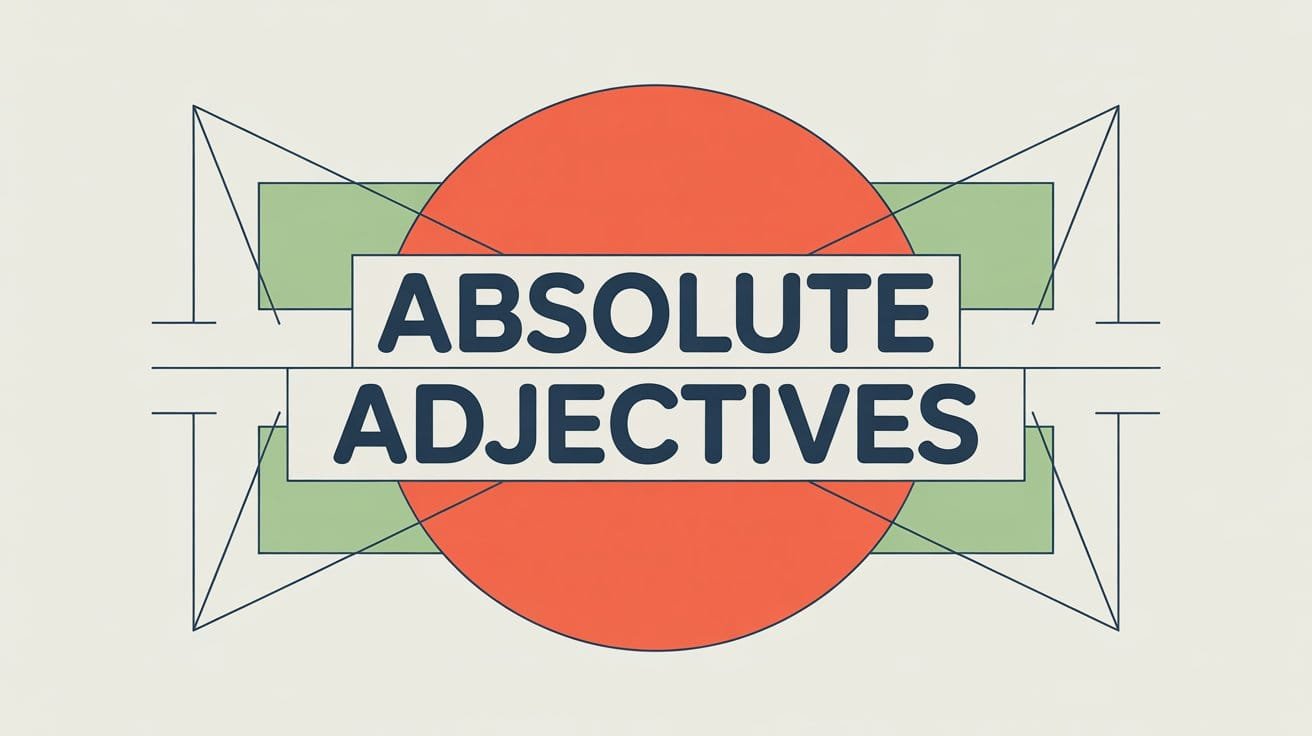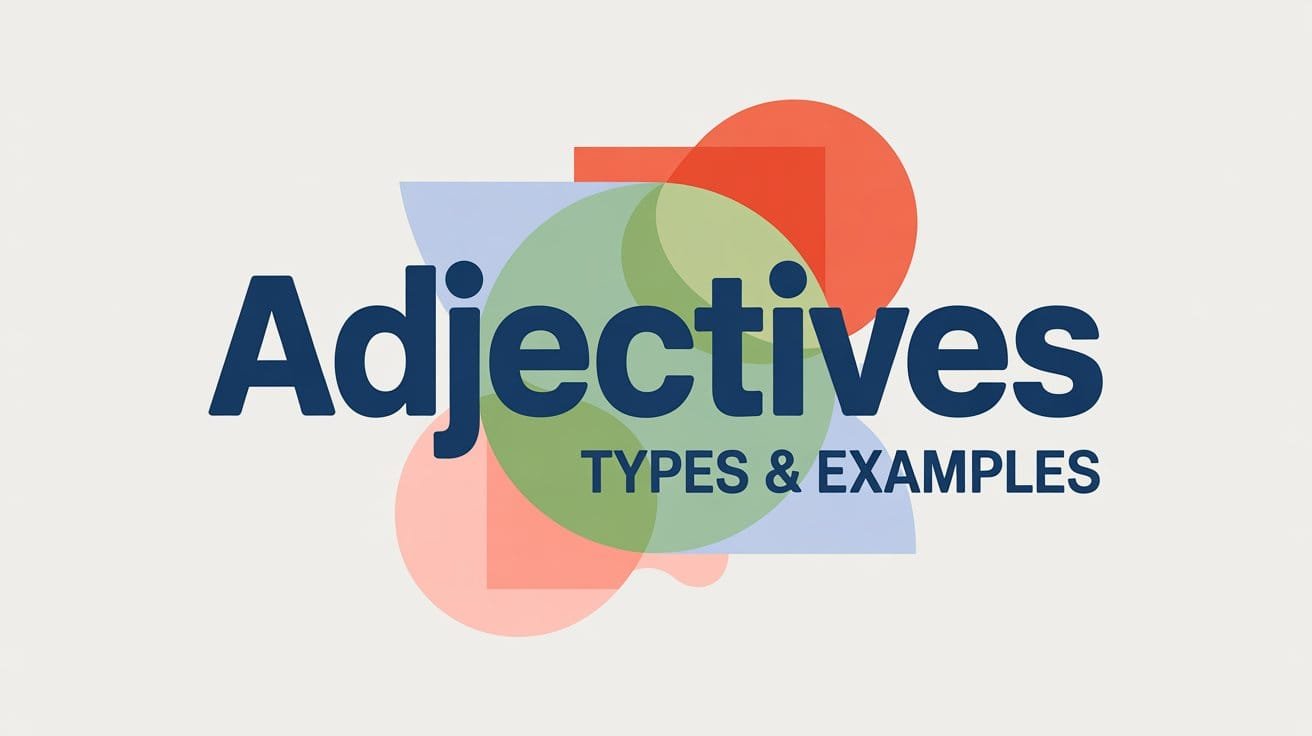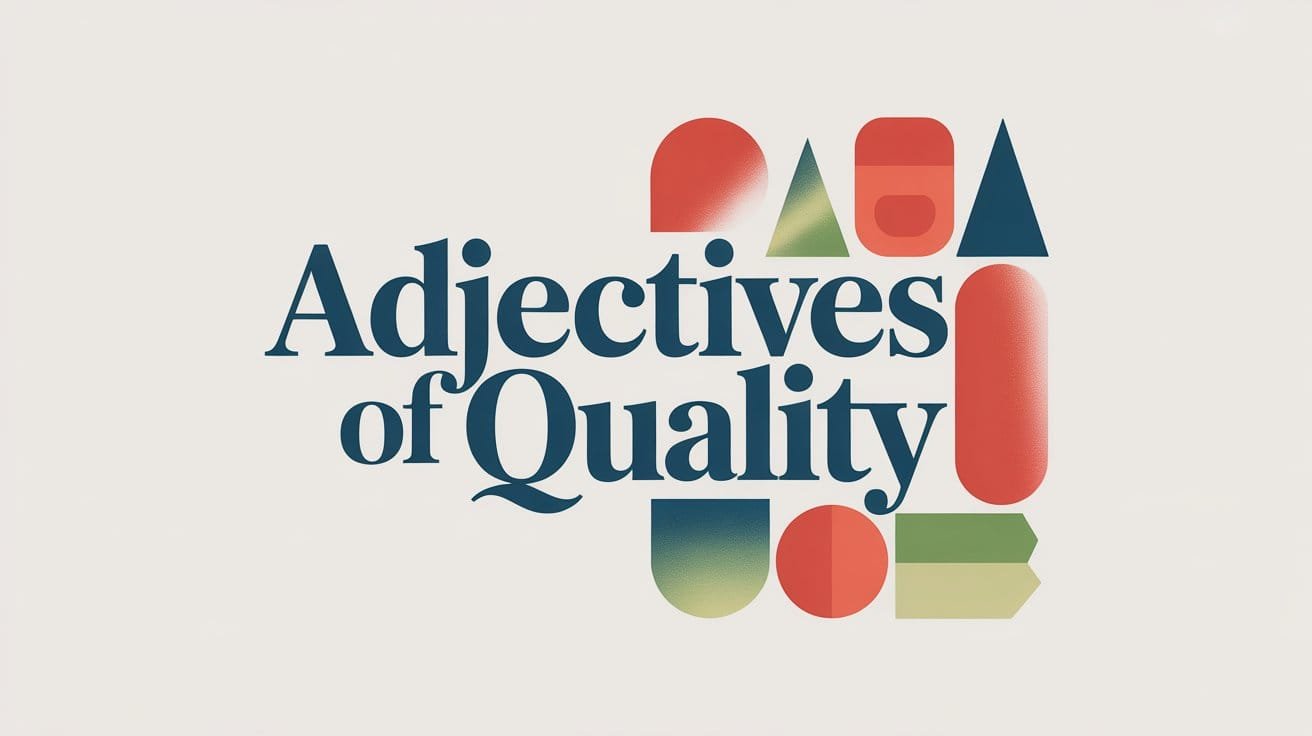Some adjectives describe qualities that can vary. Something can be cold, colder, or coldest. But others express ideas that can’t logically change in degree. A person is either married or not, dead or alive, unique or ordinary. These all-or-nothing words are called absolute adjectives.
Absolute adjectives describe qualities that are complete or unchangeable. Because of this, they don’t take comparative or superlative forms. You wouldn’t normally say more perfect or most unique.
In this guide, we’ll explore what makes an adjective “absolute,” how they differ from regular gradable adjectives, and how to use them correctly in sentences.
What Are Absolute (or Non-Gradable) Adjectives?
An absolute adjective is an adjective that describes a quality that cannot be measured or compared. It represents an all-or-nothing condition, not something that comes in levels.
For example, perfect already means complete in every way. You can’t have something that is “more perfect.” Similarly, unique means one of a kind. Saying most unique doesn’t make sense because something either is unique or it isn’t.
These adjectives are also called non-gradable adjectives because they don’t work with the usual modifiers that show degree, such as very, quite, or a little. You can’t say very married or slightly dead. Instead, they pair with intensifiers that emphasize the idea’s total nature, such as absolutely, completely, or totally.
Examples:
- Incorrect: The design is more perfect than before.
Correct: The design is absolutely perfect. - Incorrect: Her explanation was very true.
Correct: Her explanation was completely true.
The difference between gradable and non-gradable adjectives is simple:
- Gradable adjectives can vary in degree (cold → colder → coldest).
- Absolute adjectives cannot vary in degree (dead, married, unique).
Understanding this distinction helps you decide when to use comparatives and superlatives—and when to leave an adjective in its base form.
Rules and Characteristics of Absolute Adjectives
Absolute adjectives follow a few simple rules that differentiate them from regular or gradable adjectives.
They Don’t Have Comparative or Superlative Forms
Because absolute adjectives describe qualities that cannot vary, they don’t form comparatives (–er or more) or superlatives (–est or most). You can’t logically compare things that are already complete or total in meaning. For example, “That idea is unique.” (not the most unique)
They Describe All-or-Nothing Qualities
An absolute adjective expresses a state that exists entirely or not at all. Something cannot be half empty or a bit dead—at least not in literal meaning.
Examples: dead, complete, perfect, married, equal, empty, full, impossible, infinite, unique
Each of these adjectives describes a final or total state, not one that can be increased or reduced.
They Don’t Combine with Gradable Modifiers
You can’t use very, quite, rather, or a little with absolute adjectives. Instead, use adverbs like absolutely, completely, or totally that emphasize completeness.
For example, instead of “very correct“, use “absolutely correct” or “totally correct“
They Can Be Used Figuratively for Emphasis
In creative or informal writing, people sometimes use comparative or superlative forms of absolute adjectives to make a point or exaggerate for style. For example, “a more perfect world” doesn’t mean one that’s literally more complete—it’s a figurative way to say “an improved version of perfection.”
This kind of phrasing is fine in speeches or poetic language, but it’s best avoided in formal writing.
They Often Appear with Strong Intensifiers
Because these adjectives express totality, they naturally combine with intensifiers that emphasize absoluteness.
Common intensifiers: absolutely, completely, totally, perfectly, utterly, entirely, wholly
Examples: “totally full,” “utterly wrong,” “absolutely brilliant.“
These rules make it easier to recognize and use absolute adjectives correctly. Once you can spot them, you’ll avoid expressions that sound illogical or exaggerated.
List of Common Absolute Adjectives
Here’s a quick reference list of absolute adjectives commonly used in English:
| Absolute Adjectives | Absolute Adjectives | Absolute Adjectives |
|---|---|---|
| absolute | adequate | alive |
| all | alone | ancient |
| automatic | blind | clean |
| closed | complete | constant |
| correct | dead | definite |
| empty | entire | equal |
| essential | eternal | even |
| exact | existing | extreme |
| false | final | finite |
| flawless | full | genuine |
| ideal | identical | impossible |
| infinite | married | minor |
| missing | mortal | opposite |
| perfect | possible | pregnant |
| present | pure | round |
| safe | separate | single |
| square | stationary | total |
| true | unique | universal |
| unbroken | unequal | whole |
Examples of Absolute Adjectives in a Sentence
Seeing absolute adjectives in full sentences helps you understand how they work naturally in context. Notice that none of these examples use more, most, or other comparative forms.
- The solution they proposed was perfect for the situation.
- Everyone agreed that her explanation was complete and easy to follow.
- This painting is unique; there’s nothing else like it.
- The hall was full long before the concert began.
- The evidence proved the statement was true beyond doubt.
- He remained calm and certain about his decision.
- Their marriage ceremony made their bond officially final.
- It’s impossible to finish this project in one day.
- The instructions were clear and correct from the start.
- The concept of infinity means something endless or eternal.
- Each contestant followed identical procedures during the test.
- The company now holds exclusive rights to the new software.
These sentences show how absolute adjectives describe complete or total qualities without needing comparison. They add strength and precision to statements, especially in formal or factual writing.
FAQs on Absolute Adjectives
What are absolute adjectives?
Absolute adjectives describe qualities that are complete or unchangeable. They cannot be compared or graded in degree. Examples include perfect, dead, unique, complete, and married.
Why can’t absolute adjectives have comparative or superlative forms?
Because they express an idea that is already total. Something cannot be more perfect or most unique since perfect and unique describe all-or-nothing qualities.
Are absolute adjectives the same as non-gradable adjectives?
Yes. The terms absolute adjectives and non-gradable adjectives mean the same thing. Both refer to adjectives that don’t vary in intensity or degree.
Can absolute adjectives ever be used with “very” or “most”?
Not in formal English. However, in informal or creative writing, people sometimes use them for emphasis (a more perfect world, most unique design). While not grammatically correct, these expressions can sound natural in speeches or literature.
What adverbs can modify absolute adjectives?
Use adverbs that stress totality, such as absolutely, completely, totally, utterly, entirely, or perfectly.
Are all non-gradable adjectives always absolute?
Most are, but some adjectives can be both gradable and non-gradable depending on meaning.
Example: clear can mean “easy to see” (gradable) or “definite” (non-gradable).



